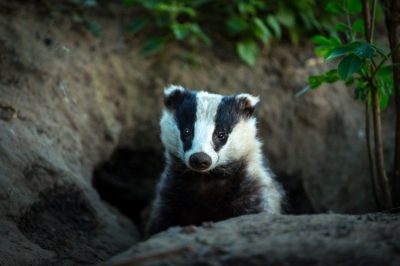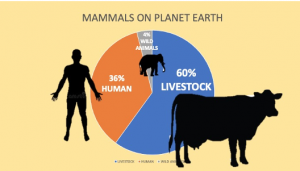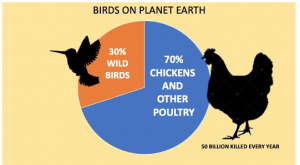Wild Animals

The Human Impact on Animal life
A study in Proceedings of the National Academy of Sciences of the United States of America in 2018 illustrated the impact of humanity on biodiversity.
The 7.6 billion humans on Earth are equal to just 0.01 percent of all the world’s inhabitants, however we have an outsized influence on the world. Since civilization was established, humans have caused the loss of 83 percent of all wild animals and 50 percent of all plants. The livestock we raise for human consumption represents a huge percentage of all animals on Earth. The harmony of the natural world has been torn apart because we want to eat animals.


Man, the Hunter
Of all the destructive mythologies that swirl through the popular imagination, Man the Hunter is one of the most destructive. This is not because large tracts of human evolution have been driven by hunting, it is because it is identified as an integral part of who we are. The very thought that hunting and killing are part of the human DNA is a dangerous idea based on folly. It promotes a toxic vision of virility, success, and dominance.
Popular culture is only enamoured by nature on television or with human vs nature adventures. We only need to look at the sculpted gardens or golf courses of the wealthy to see that we feel we could do a better job at designing nature. This is yet another display of our dominion over all the earth and the rugged individualism of modern political thought. Hunting is a great example of this.
The modern hunter is out for the kill as a photo opportunity. Using a high-powered weapon most often at a safe distance, the hunter shoots, kills and then poses alongside the dead creature to illustrate his or her dominance. It is a cruel and ignorant endeavour. This quote by one of America’s rugged hero’s sums it up.
"The big beast stood like an uncouth statue, his hide black in the sunlight; he seemed what he was, a monster surviving over from the world's past, from the days when the beasts of the prime ran riot in their strength, before man grew so cunning of brain and hand as to master them."
This is former president Theodore Roosevelt a famous big-game hunter, on his experience of killing rhinoceros.
There is little difference between someone eating meat that was killed on their behalf by someone working in an abattoir and someone hiring a guide to take them to the “wild” to kill an exotic creature. The animal has no chance of escape and is sacrificed for human pleasure. The primary difference is that by killing off all the creatures we do not domesticate for food we reduce biodiversity and ensure environmental destruction. Every creature has a place in the order of nature, the only “wild animal” seems to be the human one.
Magical Thinking and Eating Meat
Magical thinking has found a new home in the resistance to veganism. A recent example of this is from Jason Mark, the editor of Sierra, the journal of the respected environmental organization the Sierra Club. Mark has written an editorial called “Toward a Moral Case for Meat Eating.” I am sure many of their members celebrated this reprieve with a sigh of relief. No more worries about killing animals; it’s all part of a mindful return to a long-forgotten past when humans and animals shared the planet in harmony.
In Mark’s fantasy land, “the conscientious carnivore can re-establish our moral obligations to the other species with whom we share this planet.” This obligation is fulfilled by using appreciation and respecting the animals that we kill for their sacrifice. It is the “thoughts and prayers” approach.
One of the most respected poets of the American West is Gary Snyder. Snyder is an excellent and unique poet. His work is grounded in his Buddhism and environmentalism and study of Native American tradition. He is a folk hero for many. For decades, he has rebelled against what he considers the puritan aspects of vegetarianism and veganism. This is a sample of his ideas about eating animals: “If we do eat meat, it is the life, the bounce, the swish, of a great alert being with keen ears and lovely eyes, with four square feet and a huge beating heart that we eat, let us not deceive ourselves. We too will be offerings—we are all edible.” In other words, it is poetic killing. This is the magic of taking on the spirit of what we eat. If we don’t eat animals, we lose our animal spirit, our vitality. I wonder if gorillas or elephants miss that “bounce and swish,” being herbaceous.
The environmental movement, overall, is caught between wanting to clean up the environment and putting a halt to polluting technologies and a desire to not give much up. The attitudes of many environmentalists are a thinly disguised speciesism. A desire to honour the mindless beasts and to treat them “humanely”—but not to stop using them for decoration, food, or entertainment.
Zoos and Circuses
Most people would agree that the killing of wild, rare, and endangered animals is wrong. It is not wrong to put them in cages with concrete floors, behind bars, or in confined spaces. Putting them in a zoo is OK.
African elephants in the wild may require up to 24 square miles as a “home range.” This is considered a healthy habitat. A captive elephant in a zoo may be given two or three acres if lucky. A trained bear kept in a cage to dress up and ride a bike would have ten to twenty square miles to roam in a healthy environment. She would also hibernate through the winter. This would be like letting you live in your bedroom closet for the rest of your life. So much for entertainment, but what about the animals we raise in order to eat?
Adopt an Animal Friend
Cats and Dogs are among the animals that humans love the most. They bring joy and comfort to many individuals and families. It is a sad fact that so many are abandoned in the streets of cities around the world. It is estimated that there are up to 70 million stray cats alone. These animals can be adopted but sadly society seems to place prestige on certain breeds.
Every year millions of cats and dogs are killed because no one will take them in. if you love animals, please adopt one and provide them with a good home.

